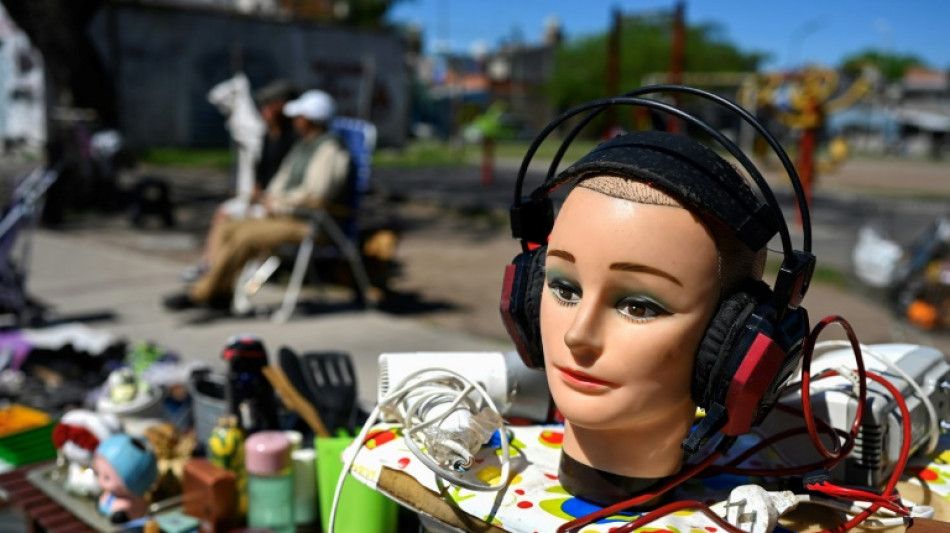
To make ends meet, Argentines sell their possessions

A street market in a Buenos Aires working-class neighborhood bustles with desperate Argentines who have taken to hawking their belongings to make ends meet as the economy sputters.
The market in Villa Fiorito -- the birthplace of football great Diego Maradona -- has gotten ever busier with an explosion in the number of so-called "blanket sellers" peddling household objects, items collected from the trash or goods bought with loans and displayed on blankets spread out on the pavement.
As Maradona looks on from several murals in the city that hails him as a rags-to-riches hero, locals spread out used toys and frayed backpacks, ice cube trays, thermos flasks without lids, well-paged magazines, worn clothes, even blister packs of pills.
As the smell of barbecue fires and grilling meat mix with that of accumulated trash, and the sounds of children at play vie with the microphone of a street pastor, some residents also sell home-made bread.
"Whenever I manage to get clothes, or if I see something that's cheap, I buy it and resell it, which is what the majority of neighbors around here do," vendor Gladys Gutierrez, 46, told AFP.
"They buy, resell, and that's how they manage to make a bit of extra money."
Gutierrez normally sells cleaning products from her home, but with fewer and fewer neighbors able to afford them, she took out a loan to buy snacks, drinks and perfumes to sell at the market.
Her husband, a construction worker, has been out of work for a while.
"People are tired, they're angry," she said.
In a country accustomed to economic crisis, Argentines are once again tightening their belts after a brief hopeful period as President Javier Milei made good on his promise of slashing inflation.
Prices have been creeping up again, consumption and production numbers are down, and the central bank has been battling a run on the peso amid fears of devaluation after mid-term elections Sunday.
Some 40 percent of Argentina's income earners work in the informal sector with no social benefits -- and many hold several jobs at once.
"It reminds me a lot of 2001," said Juana Sena, a 71-year-old market vendor, referring to the economic crash that saw Argentina default on its debt obligations -- the biggest such failure in history -- followed by deadly protests and the collapse of a government.
- 'Deepened and exacerbated' -
Economist Guillermo Oliveto told AFP about 70 percent of working class Argentines cannot make their incomes stretch beyond half a month. Some 200,000 people lost their jobs under Milei's austerity measures.
According to the IETSE economic data center, nine out of ten Argentine families are in debt -- most of it spent on food since Milei took office and slashed social spending.
"The government underestimated the impact that the real economy has on daily life, social sentiment, and consequently on electoral sentiment," said Oliveto.
"Reducing inflation was a necessary condition, but it is not sufficient."
On Sunday, the people of Villa Fiorito will vote with the rest of Argentina in elections to determine whether budget-slashing Milei, whose party is in a minority, will wield more power in parliament in the second half of his term.
In Argentina's presidential election of 2023, Milei got 27 percent of the neighborhood's vote -- which dropped to 16 percent in a provincial ballot in September.
Political scientist Matias Mora, a native of Villa Fiorito, told AFP the country's economic woes did not start under Milei, though he "deepened and exacerbated it."
And while Argentines are known for their resilience, it comes "at the cost of mental health, physical health, and being extremely worn out," he said.
I.Laskowski--GL

 London
London

 Manchester
Manchester
 Glasgow
Glasgow
 Dublin
Dublin
 Belfast
Belfast
 Washington
Washington
 Denver
Denver
 Atlanta
Atlanta
 Dallas
Dallas
 Houston Texas
Houston Texas
 New Orleans
New Orleans
 El Paso
El Paso
 Phoenix
Phoenix
 Los Angeles
Los Angeles



